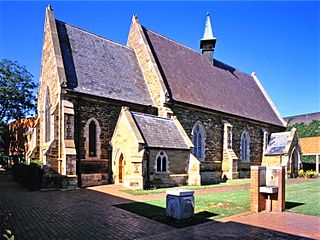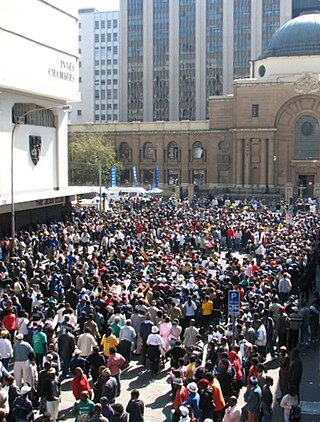
KwaZulu-Natal is a province of South Africa that was created in 1994 when the Zulu bantustan of KwaZulu and Natal Province were merged. It is located in the southeast of the country, with a long shoreline on the Indian Ocean and sharing borders with three other provinces and the countries of Mozambique, Eswatini and Lesotho. Its capital is Pietermaritzburg, and its largest city is Durban. It is the second-most populous province in South Africa, with slightly fewer residents than Gauteng.

Pietermaritzburg is the capital and second-largest city in the province of KwaZulu-Natal, South Africa. It was founded in 1838 and is currently governed by the Msunduzi Local Municipality. Its Zulu name umGungundlovu is the name used for the Umgungundlovu District Municipality. Pietermaritzburg is popularly called Maritzburg in Afrikaans, English and Zulu alike, and often informally abbreviated to PMB. It is a regionally important industrial hub, producing aluminium, timber and dairy products, as well as the main economic hub of Umgungundlovu District Municipality. The public sector is a major employer in the city due to local, district and provincial government offices located here.

The High Court of South Africa is a superior court of law in South Africa. It is divided into nine provincial divisions, some of which sit in more than one location. Each High Court division has general jurisdiction over a defined geographical area in which it is situated. The decisions of a division are binding on magistrates' courts within its area of jurisdiction. The High Court has jurisdiction over all matters, but it usually only hears civil matters involving more than 400,000 rand, and serious criminal cases. It also hears any appeals or reviews from magistrates' courts and other lower courts.

The Durban University of Technology (DUT) is a multi-campus university situated in KwaZulu-Natal, South Africa. It was formed in 2002 following the merger of Technikon Natal and ML Sultan Technikon and it was initially known as the Durban Institute of Technology. It has five campuses in Durban, and two in Pietermaritzburg. In 2022, approximately 31 991 students were enrolled to study at DUT. The university is one of five technical institutions on the African continent to offer Doctoral Degrees.

The courts of South Africa are the civil and criminal courts responsible for the administration of justice in South Africa. They apply the law of South Africa and are established under the Constitution of South Africa or under Acts of the Parliament of South Africa.
Sandile Ngcobo is a retired South African judge who was the Chief Justice of South Africa from October 2009 to August 2011. He served in the Constitutional Court of South Africa from August 1999 until his retirement in August 2011. Before that, he was a judge of the Cape Provincial Division and the Labour Appeal Court.
Thembile Lewis Skweyiya was a South African lawyer and judge who served on the Constitutional Court of South Africa between February 2004 and May 2014. He rose to prominence as a civil rights lawyer during apartheid and he served three years in the KwaZulu-Natal High Court before his elevation to the Constitutional Court.
Dhayanithie Pillay is a South African judge of the Labour Court and KwaZulu-Natal High Court.
Leona Valerie Theron is a judge of the Constitutional Court of South Africa. Before her elevation in July 2017, she served in the Supreme Court of Appeal between December 2010 and June 2017. She is the first Coloured judge to serve in the Constitutional Court.

The 2021 South African unrest, also known as the July 2021 riots, the Zuma unrest or Zuma riots, was a wave of civil unrest that occurred in South Africa's KwaZulu-Natal and Gauteng provinces from 9 to 18 July 2021, sparked by the imprisonment of former President Jacob Zuma for contempt of court. Resulting protests against the incarceration triggered wider rioting and looting, much of it said to be undertaken by people not in support of Zuma and fuelled by job layoffs and economic inequality worsened by the COVID-19 pandemic policies. The unrest began in the province of KwaZulu-Natal on the evening of 9 July, and spread to the province of Gauteng on the evening of 11 July, and was the worst violence that South Africa had experienced since the end of Apartheid.
Yvonne Thokozile Mbatha is a South African judge of the Supreme Court of Appeal. Before her appointment to the Supreme Court, she was a judge of the KwaZulu-Natal High Court from June 2011 to June 2019. She was an acting judge in the Constitutional Court between August and December 2022.
Pieter Andries Meyer is a South African judge of the Supreme Court of Appeal. Before his elevation to that court, he was a judge of the Gauteng High Court from November 2007 to November 2022. He formerly practised law in Johannesburg, where he was admitted as an advocate in 1986 and took silk in 2004.
Trevor Richard Gorven is a South African judge of the Supreme Court of Appeal. Before his elevation to that court, he served in the KwaZulu-Natal High Court from December 2008 to June 2021. He was formerly an advocate in Pietermaritzburg, primarily practising civil litigation, and he received silk status in 2006.
Dumisani Hamilton Zondi is a South African judge of the Supreme Court of Appeal. He was appointed as the chairperson of the Electoral Court in 2022. Before his elevation to the Supreme Court in June 2014, he served in the Western Cape High Court between 2007 and 2014, as well as in the Competition Appeal Court between 2011 and 2014. He entered legal practice as an attorney in 1986.
Fikile Eunice Mokgohloa is a South African judge of the Supreme Court of Appeal. Before her elevation to that court in June 2019, she was a judge of the High Court of South Africa between November 2008 and May 2019. She joined the bench as a judge of the KwaZulu-Natal Division and moved to the Limpopo Division in January 2016, becoming Deputy Judge President in Limpopo in July 2016. Born in Pretoria, she began her career as an attorney in the former Transvaal.
Petrus Arnolus Koen is South African judge who is currently serving in the KwaZulu-Natal Division of the High Court of South Africa. Before joining the bench in November 2006, he was Senior Counsel in Pietermaritzburg. He is best known for presiding in the corruption trial of former President Jacob Zuma from May 2021 until he recused himself in January 2023.
Thoba Portia Poyo-Dlwati is a South African judge who is currently serving as the Judge President of the KwaZulu-Natal High Court. She joined the court as a puisne judge in June 2014 and was elevated to the judge presidency in January 2023, appointed by President Cyril Ramaphosa as the division's first female judge president.
Mahendra Ramasamy Chetty is a South African judge of the High Court of South Africa. He was appointed to the KwaZulu-Natal Division in June 2014. Before that, Chetty was an attorney for the Legal Resources Centre, where he worked between 1990 and 2014; he was the director of the centre's Durban office from 1999 onwards. He was admitted as an attorney in 1988.
Mokgere Busisiwe Shareen Masipa is a South African judge of the High Court of South Africa. She was appointed to the KwaZulu-Natal Division in July 2016 after 14 years as a practising attorney in Durban. She is an expert on labour law.








